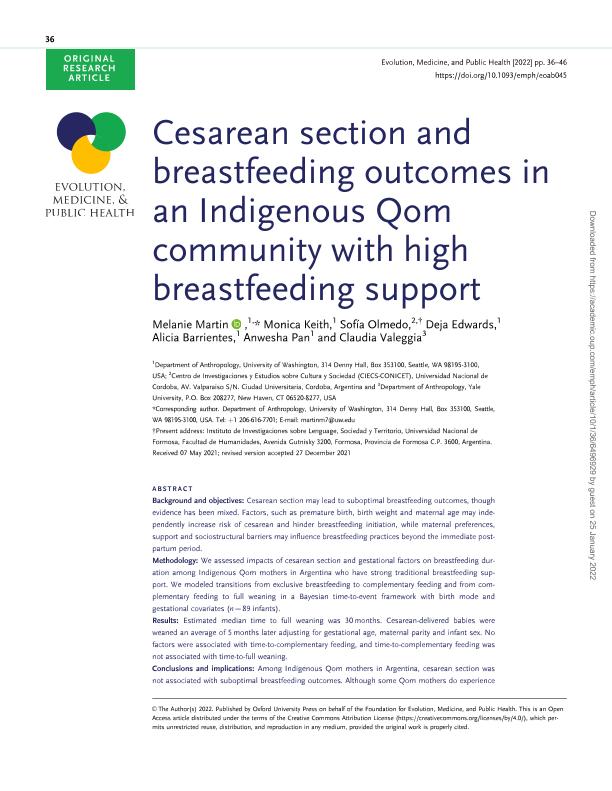Mostrar el registro sencillo del ítem
dc.contributor.author
Martin, Melanie
dc.contributor.author
Keith, Monica
dc.contributor.author
Olmedo, Sofia Irene

dc.contributor.author
Edwards, Deja
dc.contributor.author
Barrientes, Alicia
dc.contributor.author
Pan, Anwesha
dc.contributor.author
Valeggia, Claudia
dc.date.available
2022-07-04T20:20:52Z
dc.date.issued
2022-01
dc.identifier.citation
Martin, Melanie; Keith, Monica; Olmedo, Sofia Irene; Edwards, Deja; Barrientes, Alicia; et al.; Cesarean section and breastfeeding outcomes in an Indigenous Qom community with high breastfeeding support; Oxford University Press; Evolution, Medicine and Public Health; 10; 1; 1-2022; 36-46
dc.identifier.issn
2050-6201
dc.identifier.uri
http://hdl.handle.net/11336/161226
dc.description.abstract
Background and objectives: Cesarean section may lead to suboptimal breastfeeding outcomes, though evidence has been mixed. Factors, such as premature birth, birth weight and maternal age may independently increase risk of cesarean and hinder breastfeeding initiation, while maternal preferences, support and sociostructural barriers may influence breastfeeding practices beyond the immediate postpartum period. Methodology: We assessed impacts of cesarean section and gestational factors on breastfeeding duration among Indigenous Qom mothers in Argentina who have strong traditional breastfeeding support. We modeled transitions from exclusive breastfeeding to complementary feeding and from complementary feeding to full weaning in a Bayesian time-to-event framework with birth mode and gestational covariates (n = 89 infants). Results: Estimated median time to full weaning was 30 months. Cesarean-delivered babies were weaned an average of 5 months later adjusting for gestational age, maternal parity and infant sex. No factors were associated with time-to-complementary feeding, and time-to-complementary feeding was not associated with time-to-full weaning. Conclusions and implications: Among Indigenous Qom mothers in Argentina, cesarean section was not associated with suboptimal breastfeeding outcomes. Although some Qom mothers do experience early breastfeeding problems, particularly following first birth, problems are not more frequent following cesarean delivery. Traditional postpartum kin and community support during prolonged postpartum periods may be instrumental in helping mothers to overcome early breastfeeding problems due to cesarean or other risk factors. Lay Summary: We examined associations between cesarean section and breastfeeding transitions among Indigenous mothers in Argentina. Mothers delivering via cesarean section did not introduce complementary foods earlier, and conversely weaned later than mothers who delivered vaginally. Postpartum kin support typical of traditional birthing practices may help mothers overcome early breastfeeding problems.
dc.format
application/pdf
dc.language.iso
eng
dc.publisher
Oxford University Press

dc.rights
info:eu-repo/semantics/openAccess
dc.rights.uri
https://creativecommons.org/licenses/by/2.5/ar/
dc.subject
BIRTH MODE
dc.subject
BREASTFEEDING DURATION
dc.subject
CESAREAN SECTION
dc.subject
KIN SUPPORT
dc.subject
POSTPARTUM PERIOD
dc.subject.classification
Otras Ciencias de la Salud

dc.subject.classification
Ciencias de la Salud

dc.subject.classification
CIENCIAS MÉDICAS Y DE LA SALUD

dc.title
Cesarean section and breastfeeding outcomes in an Indigenous Qom community with high breastfeeding support
dc.type
info:eu-repo/semantics/article
dc.type
info:ar-repo/semantics/artículo
dc.type
info:eu-repo/semantics/publishedVersion
dc.date.updated
2022-06-30T19:02:32Z
dc.journal.volume
10
dc.journal.number
1
dc.journal.pagination
36-46
dc.journal.pais
Reino Unido

dc.journal.ciudad
Oxford
dc.description.fil
Fil: Martin, Melanie. University of Washington; Estados Unidos
dc.description.fil
Fil: Keith, Monica. University of Washington; Estados Unidos
dc.description.fil
Fil: Olmedo, Sofia Irene. Consejo Nacional de Investigaciones Científicas y Técnicas. Centro Científico Tecnológico Conicet - Córdoba. Centro de Investigaciones y Estudios sobre Cultura y Sociedad. Universidad Nacional de Córdoba. Centro de Investigaciones y Estudios sobre Cultura y Sociedad; Argentina
dc.description.fil
Fil: Edwards, Deja. University of Washington; Estados Unidos
dc.description.fil
Fil: Barrientes, Alicia. University of Washington; Estados Unidos
dc.description.fil
Fil: Pan, Anwesha. University of Washington; Estados Unidos
dc.description.fil
Fil: Valeggia, Claudia. University of Yale; Estados Unidos
dc.journal.title
Evolution, Medicine and Public Health
dc.relation.alternativeid
info:eu-repo/semantics/altIdentifier/url/https://academic.oup.com/emph/article/10/1/36/6496929
dc.relation.alternativeid
info:eu-repo/semantics/altIdentifier/doi/http://dx.doi.org/10.1093/emph/eoab045
Archivos asociados
